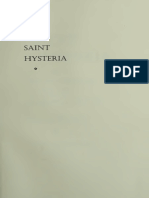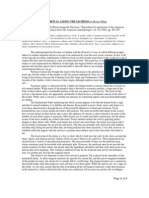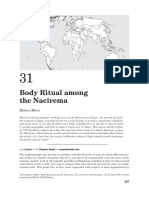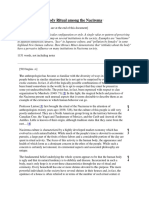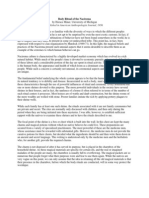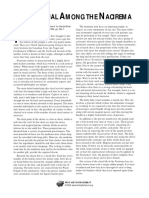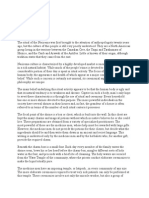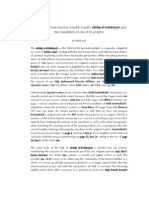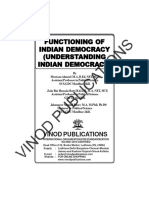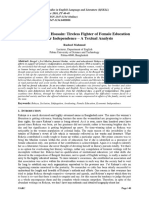Body Ritual Among The Nacirema
Body Ritual Among The Nacirema
Uploaded by
Mark SimeonCopyright:
Available Formats
Body Ritual Among The Nacirema
Body Ritual Among The Nacirema
Uploaded by
Mark SimeonOriginal Title
Copyright
Available Formats
Share this document
Did you find this document useful?
Is this content inappropriate?
Copyright:
Available Formats
Body Ritual Among The Nacirema
Body Ritual Among The Nacirema
Uploaded by
Mark SimeonCopyright:
Available Formats
BODY RITUAL AMONG THE NACIREMA
Horace Miner
The anthropologist has become so familiar with the diversity of ways in which the different
peoples behave in similar situations that he is not apt to be surprised by even the most exotic
customs. In fact, if all of the logically possible combinations of behavior have not been found
somewhere in the world, he is apt to suspect that they must be present in some yet undescribed
tribe. This point has, in fact, been expressed with respect to clan organization by Murdock
!"#"$%!&. In this light, the magical beliefs and practices of the 'acirema present such unusual
aspects that it seems desirable to describe them as an example of the extremes to which human
behavior can go.
'acirema culture is characterized by a highly developed market economy which as evolved in
a rich natural habitat. (hile much of the people)s time is devoted to economic pursuits, a large
part of the fruits of these labors and a considerable portion of the day are spent in ritual activity.
The focus of this activity is the human body, the appearance and health of which loom as a
dominant concern in the ethos of the people. (hile such a concern is certainly not unusual, its
ceremonial aspects and associated philosophy are uni*ue.
The fundamental belief underlying the whole system appears to be that the human body is
ugly and that its natural tendency is to debility and disease. Incarcerated in such a body, man)s
only hope is to avert these characteristics through the use of the powerful influences of ritual and
ceremony. +very household has one or more shrines devoted to this purpose. The more
powerful individuals in the society have several shrines in their houses and, in fact, the opulence
of a house is often referred to in terms of the number of such ritual centers it possesses. Most
houses are of wattle and daub construction, but the shrine rooms of the more wealthy are walled
with stone. ,oorer families imitate the rich by applying pottery pla*ues to their shrine walls.
(hile each family has at least one such shrine, the rituals associated with it are not family
ceremonies but are private and secret. The rites are normally only discussed with children, and
then only during the period when they are being initiated into these mysteries. I was able,
however, to establish sufficient rapport with the natives to examine these shrines and to have the
rituals described to me.
The focal point of the shrine is a box or chest which is built into the wall. In this chest are kept
the many charms and magical potions without which no native believes he could live. These
preparations are secured from a variety of specialized practitioners. The most powerful of these
are the medicine men, whose assistance must be rewarded with substantial gifts. However, the
medicine men do not provide the curative potions for their clients, but decide what the
ingredients should be and then write them down in an ancient and secret language. This writing
is understood only by the medicine men and by the herbalists who, for another gift, provide the
re*uired charm.
-eneath the charm.box is a small font. +ach day every member of the family, in succession,
enters the shrine room, bows his head before the charm.box, mingles different sorts of holy
water in the font, and proceeds with a brief rite of ablution. The holy waters are secured from
the (ater Temple of the community, where the priests conduct elaborate ceremonies to make the
li*uid ritually pure.
In the hierarchy of magical practitioners, and below the medicine men in prestige, are
specialists whose designation is best translated /holy.mouth.men./ The 'acirema have an almost
pathological horror of and fascination with the mouth, the condition of which is believed to have
a supernatural influence on all social relationships. (ere it not for the rituals of the mouth, they
believe that their teeth would fall out, their gums bleed, their 0aws shrink, their friends desert
them, and their lovers re0ect them. They also believe that a strong relationship exists between
oral and moral characteristics. 1or example, there is a ritual ablution of the mouth for children
which is supposed to improve their moral fiber.
It is to be hoped that, when a thorough study of the 'acirema is made, there will be careful
in*uiry into the personality structure of these people. 2ne has but to watch the gleam in the eye
of a holy.mouth.man, as he 0abs an awl into an exposed nerve, to suspect that a certain amount of
sadism is involved. If this can be established, a very interesting pattern emerges, for most of the
population shows definite masochistic tendencies. It was to these that ,rofessor 3inton referred
in discussing a distinctive part of the daily body ritual which is performed only by men. This part
of the rite involves scraping and lacerating the surface of the face with a sharp instrument.
4pecial women)s rites are performed only four times during each lunar month, but what they lack
in fre*uency is made up in barbarity. 5s part of this ceremony, women bake their heads in small
ovens for about an hour. The theoretically interesting point is that what seems to be a
preponderantly masochistic people have developed sadistic specialists.
In conclusion, mention must be made of certain practices which have their base in native
esthetics but which depend upon the pervasive aversion to the natural body and its functions.
There are ritual fasts to make fat people thin and ceremonial feasts to make thin people fat. 4till
other rites are used to make women)s breasts larger if they are small, and smaller if they are
large. 6eneral dissatisfaction with breast shape is symbolized in the fact that the ideal form is
virtually outside the range of human variation. 5 few women afflicted with almost inhuman
hyper.mamrnary development are so idolized that they make a handsome living by simply going
from village to village and permitting the natives to stare at them for a fee.
2ur review of the ritual life of the 'acirema has certainly shown them to be a magic.ridden
people. It is hard to understand how they have managed to exist so long under the burdens which
they have imposed upon themselves. -ut even such exotic customs as these take on real
meaning when they are viewed with the insight provided by Malinowski when he wrote$
/3ooking from far and above, from our high places of safety in the developed civilization, it is
easy to see all the crudity and irrelevance of magic. -ut without its power and guidance early
man could not have mastered his practical difficulties as he has done, nor could man have
advanced to the higher stages of civilization./
List of adjectives:
You might also like
- Mazzoni - Saint Hysteria (Neurosis, Mysticism, and Gender in European Culture) PDFDocument248 pagesMazzoni - Saint Hysteria (Neurosis, Mysticism, and Gender in European Culture) PDFhidalgotoledo100% (1)
- Body Rituals of The NaciremaDocument5 pagesBody Rituals of The NaciremaKirig_MimingNo ratings yet
- The Druidic Art of Divination: Understanding the Past and Seeing into the FutureFrom EverandThe Druidic Art of Divination: Understanding the Past and Seeing into the FutureRating: 3.5 out of 5 stars3.5/5 (3)
- Taranatha S Life of Krsnacarya KanhaDocument191 pagesTaranatha S Life of Krsnacarya KanhaSiegfried Schwaiger100% (9)
- Miner BodyRitualAmongNacirema PDFDocument5 pagesMiner BodyRitualAmongNacirema PDFHetNo ratings yet
- Body Ritual Among The Nacirema Horace MinerDocument5 pagesBody Ritual Among The Nacirema Horace MinerSamar MoussaNo ratings yet
- Miner Body Ritual Among The NaciremaDocument4 pagesMiner Body Ritual Among The NaciremaCorwin DavisNo ratings yet
- Nacirema FLM ReformatDocument3 pagesNacirema FLM ReformatCharles BunceNo ratings yet
- Nacirema ArticleDocument6 pagesNacirema ArticlewonomiNo ratings yet
- Body Ritual Among The NaciremaDocument4 pagesBody Ritual Among The Naciremaclz1024No ratings yet
- BodyRitualAmongtheNacirema Miner PDFDocument5 pagesBodyRitualAmongtheNacirema Miner PDFWilliford AbunasNo ratings yet
- "Body Ritual Among The Nacirema": MinerDocument7 pages"Body Ritual Among The Nacirema": MinerALLIA LOPEZNo ratings yet
- Body Ritual Among The NaciremaDocument6 pagesBody Ritual Among The NaciremaAshita NaikNo ratings yet
- Body Rituals Among The NaciremaDocument5 pagesBody Rituals Among The NaciremaCarrie RidenhourNo ratings yet
- Body Rituals Among NaciremaDocument7 pagesBody Rituals Among NaciremamikejosephbarcenaNo ratings yet
- Miner (1956) Body Ritual Among The NaciremaDocument6 pagesMiner (1956) Body Ritual Among The NaciremaJohn SmithNo ratings yet
- 1.2.6 Read - Body Ritual Among The Nacirema - (Reading Materials)Document8 pages1.2.6 Read - Body Ritual Among The Nacirema - (Reading Materials)LiaNo ratings yet
- Body Ritual Among The NaciremaDocument7 pagesBody Ritual Among The NaciremaJlindy61No ratings yet
- Miner Body RitualAnthropologyDocument6 pagesMiner Body RitualAnthropologyzuruk2000No ratings yet
- (1956) Body Ritual Among The Nacirema (Miner)Document6 pages(1956) Body Ritual Among The Nacirema (Miner)AAAASSSNo ratings yet
- Published in American Anthropologist Journal, 1956: Body Ritual of The NaciremaDocument3 pagesPublished in American Anthropologist Journal, 1956: Body Ritual of The NaciremaEmerson LabisNo ratings yet
- Miner - Body Ritual Among The NaciremaDocument6 pagesMiner - Body Ritual Among The Naciremadoe.teeth.lostNo ratings yet
- Body Ritual Among The NaciremaDocument6 pagesBody Ritual Among The NaciremacarleoNo ratings yet
- Body Ritual Among The NaciremaDocument6 pagesBody Ritual Among The NaciremaCandy FreedNo ratings yet
- Blackwell Publishing American Anthropological AssociationDocument6 pagesBlackwell Publishing American Anthropological AssociationErin BellNo ratings yet
- Body Ritual of The Nacirema Reading and DiscussionDocument4 pagesBody Ritual of The Nacirema Reading and DiscussionAnnika SolotkoNo ratings yet
- Body Ritual Among The NaciremaDocument6 pagesBody Ritual Among The Naciremaiulya16s6366No ratings yet
- Texto 04 Miner, H - Body Ritual Among The NaciremaDocument6 pagesTexto 04 Miner, H - Body Ritual Among The NaciremaDavid FilhoNo ratings yet
- Miner - Body Ritual of The NaciremaDocument4 pagesMiner - Body Ritual of The Naciremabkaplan452No ratings yet
- Body Ritual Among The NaciremaDocument2 pagesBody Ritual Among The NaciremaBruna TrianaNo ratings yet
- 5.1. Miner 1956 - Body Ritual Among The NaciremaDocument6 pages5.1. Miner 1956 - Body Ritual Among The NaciremaAlexandra OlteanuNo ratings yet
- Nacirema PDFDocument1 pageNacirema PDFJejan fersNo ratings yet
- Horace Miner, Body Rituals Among The NaciremaDocument6 pagesHorace Miner, Body Rituals Among The Naciremagtamer231No ratings yet
- Body Ritual Among The NaciremaDocument2 pagesBody Ritual Among The Naciremaapi-280706116No ratings yet
- 2.1 BodyRitualAmongTheNaciremaDocument6 pages2.1 BodyRitualAmongTheNaciremazerjiss.zahirNo ratings yet
- After Reading Both Articles in This Packet, Answer The Questions Below. Your Responses Will Be Due On 4/22Document8 pagesAfter Reading Both Articles in This Packet, Answer The Questions Below. Your Responses Will Be Due On 4/22Annika SolotkoNo ratings yet
- Body Ritual Among The Nacirema TribeDocument2 pagesBody Ritual Among The Nacirema TribeDon Henry100% (1)
- NaciremaDocument3 pagesNaciremaREN OFFICIALNo ratings yet
- Techniques of Modern Shamanism by Phil HineDocument46 pagesTechniques of Modern Shamanism by Phil HineTaur100% (21)
- Esoteric-Shamanism 1 PDFDocument47 pagesEsoteric-Shamanism 1 PDFManabilo Franco100% (2)
- The Origins of ChristianityDocument162 pagesThe Origins of Christianityosomoro100% (3)
- Chapter 2 Indigenous Sacred WaysDocument8 pagesChapter 2 Indigenous Sacred WaysThalia Sanders100% (1)
- Finding Sanctuary in Nature: Simple Ceremonies in the Native American Tradition for Healing Yourself and OthersFrom EverandFinding Sanctuary in Nature: Simple Ceremonies in the Native American Tradition for Healing Yourself and OthersRating: 5 out of 5 stars5/5 (2)
- A Druid's Handbook to the Spiritual Power of Plants: Spagyrics in Magical and Sexual RitualsFrom EverandA Druid's Handbook to the Spiritual Power of Plants: Spagyrics in Magical and Sexual RitualsNo ratings yet
- Ossman & Steel's Classic Household Guide to Appalachian Folk Healing: A Collection of Old-Time Remedies, Charms, and SpellsFrom EverandOssman & Steel's Classic Household Guide to Appalachian Folk Healing: A Collection of Old-Time Remedies, Charms, and SpellsRating: 4 out of 5 stars4/5 (3)
- Journeying Through the Invisible: The Craft of Healing With, and Beyond, Sacred Plants, as Told by a Peruvian Medicine ManFrom EverandJourneying Through the Invisible: The Craft of Healing With, and Beyond, Sacred Plants, as Told by a Peruvian Medicine ManNo ratings yet
- Encounters with Mermaids: Lessons from the Realm of the Water ElementalsFrom EverandEncounters with Mermaids: Lessons from the Realm of the Water ElementalsNo ratings yet
- Ozark Folk Magic: Plants, Prayers & HealingFrom EverandOzark Folk Magic: Plants, Prayers & HealingRating: 4.5 out of 5 stars4.5/5 (2)
- Nomad Gods RPGDocument8 pagesNomad Gods RPGPaul SavvyNo ratings yet
- D Quiz B TvetDocument75 pagesD Quiz B TvetAllen SdbNo ratings yet
- Critical Intro To Subh-i-Azal's Akhlaq RuhaniyinDocument5 pagesCritical Intro To Subh-i-Azal's Akhlaq RuhaniyinWahid AzalNo ratings yet
- Keryx PDFDocument3 pagesKeryx PDFmagius87100% (1)
- KalachakraDocument8 pagesKalachakraHarihara KrishnanNo ratings yet
- MC 1215Document28 pagesMC 1215mcchronicleNo ratings yet
- Economist GRE WOrdsDocument53 pagesEconomist GRE WOrdsParkerNo ratings yet
- Your Plan For Ramadhan - Sheikh Haitham Al HaddadDocument12 pagesYour Plan For Ramadhan - Sheikh Haitham Al HaddadstarofknowledgecomNo ratings yet
- Education Development in Saudi Arabia-Historical ProjectDocument32 pagesEducation Development in Saudi Arabia-Historical ProjectlivenessNo ratings yet
- Result Sheet of 1st Year 18th Supplementary Examination of Pharmacy Technician Held On 20.10.2018Document131 pagesResult Sheet of 1st Year 18th Supplementary Examination of Pharmacy Technician Held On 20.10.2018Muhammad BabarNo ratings yet
- Goel Hubbard PDFDocument15 pagesGoel Hubbard PDFBrian John Mc100% (1)
- Supercorp Fanfictions On Twitter - Thread of Greek Mythology Supercorp AUs - TwitterDocument6 pagesSupercorp Fanfictions On Twitter - Thread of Greek Mythology Supercorp AUs - TwitterWiktoria MuchaNo ratings yet
- 03 FlowersDocument18 pages03 FlowersSebastien McCollinNo ratings yet
- Conflict Handbook PDFDocument147 pagesConflict Handbook PDFZafie ZafriNo ratings yet
- Political PDF MDocument180 pagesPolitical PDF MDrShakoor Ahmad DarNo ratings yet
- JainDocument24 pagesJainSwapnil AjmeraNo ratings yet
- Đề điều kiện vào 10 chuyên Anh HN năm 2017: Quiz ID: 4123Document16 pagesĐề điều kiện vào 10 chuyên Anh HN năm 2017: Quiz ID: 4123Bao NgocNo ratings yet
- Blessed Earth: Inspirational Quotes & ScripturesDocument4 pagesBlessed Earth: Inspirational Quotes & ScripturesmoebiusdesignNo ratings yet
- 6Document9 pages6Md Shafiqul Hasan ShihabNo ratings yet
- Cifra Club - Hillsong United - OceansDocument2 pagesCifra Club - Hillsong United - OceansMatheus SaboritoNo ratings yet
- Castillo, Kyle Vince A. Bscrim 1-DDocument2 pagesCastillo, Kyle Vince A. Bscrim 1-DVina Mae AtaldeNo ratings yet
- Basics of Sanatan DharmaDocument14 pagesBasics of Sanatan DharmaSuprava MishraNo ratings yet
- Tugas Buat Data AM 26Document12 pagesTugas Buat Data AM 26setiap kantungNo ratings yet
- The Trail of Tears Poems RevisitedDocument9 pagesThe Trail of Tears Poems RevisitedIJELS Research JournalNo ratings yet
- Character Analysis NoliDocument11 pagesCharacter Analysis NoliErich Posillo AranasNo ratings yet
- TahakumDocument73 pagesTahakumAhl Sunnah Wel Jemah TV75% (4)
- Here Now (Madness) LyricsDocument2 pagesHere Now (Madness) LyricsIan DalisayNo ratings yet
- On Not Being A PhilosopherDocument2 pagesOn Not Being A PhilosopherDibakar Bhattacharjee0% (1)


